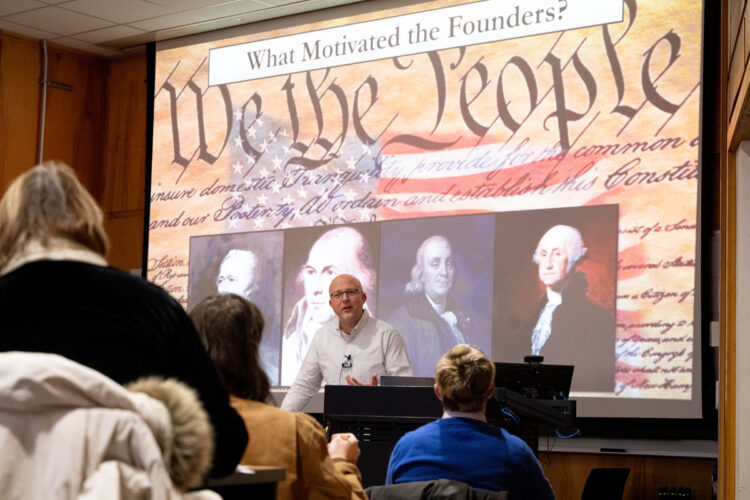The University of Montana received a $500,000 grant from the Mellon Foundation to support a new Democracy Studies Program. Led by history professors Claire Arcenas, Kyle Volk, and Jeff Wiltse, the grant seeks to foster democratic values and revitalize the humanities while also supporting faculty research over the next three years.
UM is one of 30 colleges and universities across the nation to receive this financial support to develop humanities-grounded research and curricular projects from the Mellon Foundation, the nation’s largest funder of the arts, culture and humanities.
“Fostering deep understanding of democracy and the development of civic knowledge are core to our mission at the University of Montana and one of the most important ways we prepare students to become informed, engaged citizens,” said Adrea Lawrence, provost and vice president for academic affairs. “This grant will amplify the work of our faculty in the humanities, providing transformative opportunities for students to deepen their understanding of civic engagement, actively contribute to strengthening democracy, and make a lasting impact as future leaders.”
The new interdisciplinary Democracy Studies Program, co-directed by Volk and Political Science professor Robert Saldin, is the first of its kind in Montana and kicked off this past fall as a minor. Beginning next academic year, a First-Year Civics Initiative, led by History and Classics professor Scott Arcenas, will invite students across campus to learn the fundamentals of good citizenship and the history of American democracy. Eventually, the program plans to offer students a certificate in Civic Knowledge and a major in Democracy Studies.
“We are all tremendously excited to receive this grant and get started on the work supported by this grant, which will have far-reaching impacts on campus as well as across the state and region,” said project leader Claire Arcenas. “This will help establish UM as the top regional destination for students interested in studying democracy – past, present and future.”
The interdisciplinary Democracy Studies minor pulls together courses from history, philosophy, political science, journalism, sociology and other disciplines. While there are already many students pursuing the new minor, Volk said the First-Year Civics Initiative is in part designed to expose students pursuing a variety of majors to the Democracy Studies minor.
“Our hope is to bring students who are studying, for example, business, forestry, pre-med, or public health, to the minor,” he said. “I hope we’re able to show students that essential themes of democracy—from leadership, citizenship, and ethics to governance, public policy, and dissent—matter to so many pursuits. I can’t think of anything more important right now than preparing students to be good citizens.”
The grant will also allow the history department to bring on a two-year postdoctoral fellow who will teach a variety of courses in U.S. history. The fellow will also help develop and teach a new course, The Challenge of Citizenship, through the First-Year Civics Initiative.
The other portion of work supported by the Mellon Foundation grant will support five faculty research projects related to democracy:
- Jeff Wiltse, professor and chair of the history department, will study how public culture in America during the 19th century was shaped by public music.
- Kyle Volk, professor of history, will research personal liberty and the politics of dissent.
- Tobin Shearer, professor of history and director of African-American Studies, will analyze how the life of activist Vincent Harding exposed how religious pluralism shaped the struggle for multiracial democracy.
- Claire Arcenas, associate professor of history, will study how Americans have engaged with the Declaration of Independence in formal and informal educational settings over the past 250 years.
- Robert Saldin, professor of political science and director of the ethics and public affairs program at the Mansfield Center, will examine the theory of community-based projects that seek to bridge divides, foster cooperation and empower diverse citizens to pursue and achieve common goals.
“All five projects complement one another,” explains Wiltse, “and explore the crucial roles that a pluralistic public culture, tolerance for dissent and peaceful protest, commitment to liberal arts education, and pursuit of the common good have played in sustaining American democracy. Our goal is to produce cutting-edge scholarship that informs our teaching in the Democracy Studies Program as well as public understanding of the circumstantial conditions that have enabled democracy to flourish in the United States.”
By Skylar Rispens, UM News Service

